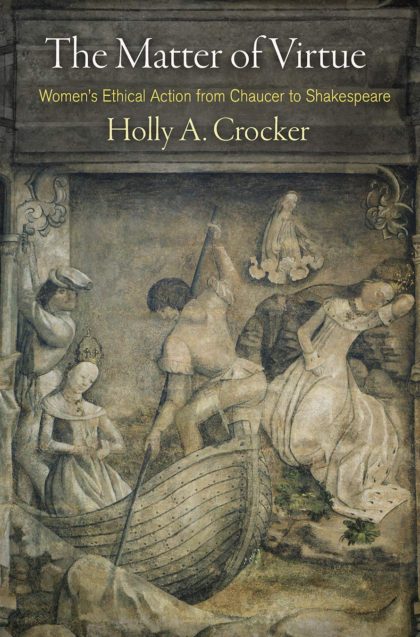Book Reviews
Review of Holly Crocker’s The Matter of Virtue: Women’s Ethical Action from Chaucer to Shakespeare
 Holly Crocker’s The Matter of Virtue (U. of Penn. Press, 2019) argues that premodern authors figured women’s virtue as a moral quality developed under conditions of vulnerability, oppression, and mistreatment. This wide-ranging, densely argued book surveys a range of characters and types, from medieval virgin martyrs to early modern stage shrews. Frequently, it analyzes multiple versions of the same figure: the first two chapters, for example, delve into the various Cressidas portrayed by Chaucer, Lydgate, Henryson, Tudor lyric poets, and Shakespeare; the final chapter surveys multiple early modern Griseldas, with glances back to Chaucer’s Clerk’s Tale. The women in this miscellaneous gathering are united in two ways: first by experiencing extraordinary hardship—generally inflicted by individual men enacting masculinist agendas predicated on the control of women—and second in developing specifically feminine forms of excellence in response to this hardship. Whether meeting conditions of oppression with compliance or resistance, these figures embody what Crocker terms “material virtue.”
Holly Crocker’s The Matter of Virtue (U. of Penn. Press, 2019) argues that premodern authors figured women’s virtue as a moral quality developed under conditions of vulnerability, oppression, and mistreatment. This wide-ranging, densely argued book surveys a range of characters and types, from medieval virgin martyrs to early modern stage shrews. Frequently, it analyzes multiple versions of the same figure: the first two chapters, for example, delve into the various Cressidas portrayed by Chaucer, Lydgate, Henryson, Tudor lyric poets, and Shakespeare; the final chapter surveys multiple early modern Griseldas, with glances back to Chaucer’s Clerk’s Tale. The women in this miscellaneous gathering are united in two ways: first by experiencing extraordinary hardship—generally inflicted by individual men enacting masculinist agendas predicated on the control of women—and second in developing specifically feminine forms of excellence in response to this hardship. Whether meeting conditions of oppression with compliance or resistance, these figures embody what Crocker terms “material virtue.”
As this key phrase and the book’s title announce, Crocker understands premodern female excellence as embodied. Virtue, here, dwells in matter, and it develops in the context of materially realized social relations—which is to say, in conditions of contingency and connectedness. Drawing on herbals and other practical texts, Crocker’s deeply researched introduction reminds us that one available premodern understanding of virtue was the vital, animating force of any material body. As “bodies typically and insistently associated with matter” (5), women in particular were…
Please login or subscribe to continue reading.
Please subscribe to The Shakespeare Newsletter to continue reading.
Subscribe Now